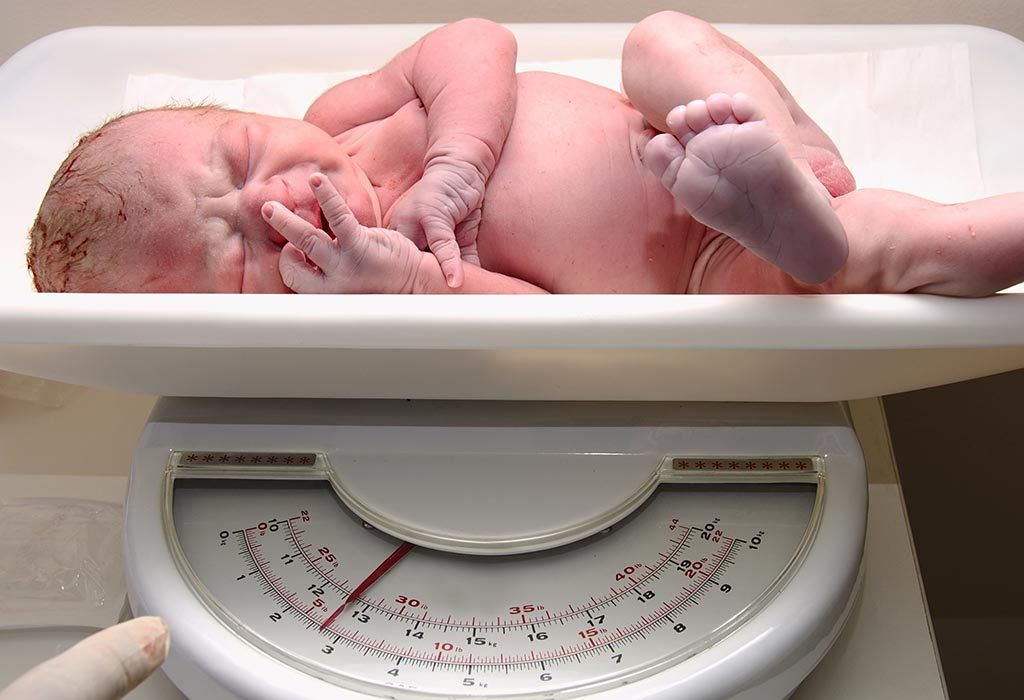In this Article
- Video: Newborn Baby Weight Gain – What’s Normal and What’s Not
- Why Does Newborn Baby Weight Gain Matter?
- Factors Contributing to Newborn’s Weight
- What is The Average Newborn Baby’s Weight?
- Normal Weight Loss for New Born In The Initial Days after Birth
- Normal Weight Gain for New Born In The Initial Days after Birth
- Signs Your Newborn Is Getting Enough Feeding
- What Should You Do if Your Baby Is Not Gaining Enough Weight or Losing Too Much Weight
- Managing Excess Weight Gain or Weight Loss In Your Newborn baby
- When to Call The Doctor
The most common way for one to understand the health of any being is growth. When our babies grow, it instils a comfort within us. Weight gain (along with height) becomes one of the key indicators of newborn babies’ growth. Hence, it becomes important for us, as parents, to closely observe and analyze the weight gain.
Video: Newborn Baby Weight Gain – What’s Normal and What’s Not
Why Does Newborn Baby Weight Gain Matter?
The weight gain is consequential for an infant to achieve their milestones. Globally, paediatricians and health nurses prefer to keep babies under close observation for the first 24 hours. This is to determine the weight loss or gain of babies that will be a clear indication of their well-being. This will be followed by weekly appointments to check the baby. You would be advised by the doctor to bring the child to the hospital for a check-up every week. It is to make sure the child has is receiving enough nutrition to gain the right amount of weight.
Factors Contributing to Newborn’s Weight
Here are some of the factors that contribute to a newborn’s weight during his growth.
- Factors that contribute to the weight of your baby extend much beyond birth: the race to which the baby belongs, if generally you or the other parent’s family have had large babies or small ones.
- The genes of parents play a key role in the weight of the baby.
- Your diet and sensitivity towards pregnancy may also affect the weight. For example, having severe sensitivity towards food during one of your trimesters might have affected the baby.
- Unlike popular belief, research shows that younger mothers give birth to smaller babies while women in their 30s give birth to larger ones.
- The month of the baby’s birth plays a crucial part in birth-weight. A premature baby will weigh lesser than a baby out on its D day with full nine months in the womb.
- The first-borns tend to weigh less than the subsequent children.
- Twins/Triplets, or multiple births would have to divide nutrition among themselves in the womb, thus reducing the birth weight of every individual baby.
What is The Average Newborn Baby’s Weight?
The average weight of a newborn baby is between 2.5kg to 3.5kg. Anything lesser or more is uncommon and will be closely observed by the health nurse.

Normal Weight Loss for New Born In The Initial Days after Birth
It is natural for babies to lose weight after they are born. Doctors consider it normal for babies to lose up to 10% of their birth weight in the first few days of their life. However, they gain it back within ten days to two weeks. Breastfed babies and premature babies will take a longer time to come back to their birth weight.
Normal Weight Gain for New Born In The Initial Days after Birth
The average weight gain of these babies is 25 grams per day for the next three months of their life. This reduces in the next two quarters. The weight pattern shifts to 20 grams in the second quarter and 15 grams in the third respectively. The average gain of a newborn baby in a month is 175 to 200 grams per week. You can count it to be 700-800 (approx.) grams per month.
The baby is certified to double its weight in five or six months if enough nutrition has been received. A baby who feeds on the bottle may gain lesser than a breastfed baby.
Signs Your Newborn Is Getting Enough Feeding
Whether the baby is well fed or not is a perennial worry for parents. It is neither possible to run to the hospital to check the baby’s per day weight nor is it necessary to get a baby scale home. These signs should indicate if the baby is well fed:
- Does not cry after a feed
- Sleeps well
- Your breasts feel lighter after a feed/ the bottle is empty after a feed
- Feeds 8-12 times a day
- Poops regularly
- Poop is yellow
- Heavy wet nappies (6-8 times a day) are good indicators
- Per week weight gain
What Should You Do if Your Baby Is Not Gaining Enough Weight or Losing Too Much Weight
Parents do tend to overthink and over worry sometimes. The baby is achieving growth milestones, sooner or later, is a true indicator of growth. It would mean that the baby is receiving enough food and nutrition for development. However, babies should not be losing more than 10 % of the birth weight in the initial days of life. This 10% weight loss is usually the loss of extra fluids that the baby had from the womb. And, newborn babies do not gain weight during the initial period of latching (breastfeeding) or learning to bottle feed. This happens since they may face difficulties to suck or have jaw coordination problems and may not drink enough thus losing some weight.
Managing Excess Weight Gain or Weight Loss In Your Newborn baby
If you notice that your baby is losing too much weight or is gaining excess weight, you can try the following things to manage it.
- Maintain feed: Decrease the feed to strike a balance. Make sure there are not more than three hours between a feed. Also, make sure the baby finishes and consumes the hind milk which has the most amount of fat to drink.
- Coordination: If the baby is unable to latch on to the breast and thus receiving very less food then enrol for lactation classes. The classes will help both the mother and the baby coordinate and have a better breastfeeding experience. Another option is to substitute breastfeeding with a bottle.
- Avoid the substitute: They comfort themselves from sucking on to water or pacifier, avoid it during meal times or in and around meal times.
- Your nutrition and health: Make sure you have enough milk. Eat well and sleep right. A simple breast pump will show you how much milk you produce. In fact, research explains that pump also stimulates an increase in breast milk.
- Avoiding Abnormal Gain: If you feel the baby is gaining weight abnormally and the doctor has prescribed that extra food intake is observed. Look for signs such as her turning her head away or, spitting the nipple out and stop feeding then and there.
When to Call The Doctor
There are a few common signs that may indicate an imbalance in development:
- Lack of sleep
- Has not come back to birth weight within the two weeks
- Seems difficult to pacify and does not stop crying

If this causes worry, then please go to your health check-up nurse and observe along with them the schedule of the baby’s food habits and sleeping habits. The chances are that these may be the baby’s pattern and can be easily nurtured back to a better balance.
However, sometimes certain signs indicate a greater risk. Any abnormal weight loss in the coming weeks will lead to health problems such as Jaundice (hyperbilirubinemia) and low blood sugar (hypoglycemia).
If the weight loss is more than this or if you do not see an average increase in weight, you will see indicators such as:
- Fewer wet nappies in the day
- Dry lips or skin
- Constantly irritated
- Loose skin
- The soft part of her head is sunken
Though birth weight is important, weight gain or loss is an indicator of the development. Babies will catch up sooner or later. If ever in doubt, take the advice of your paediatrician who will either help you out or assure you that all is fine.
It is the natural instinct for a parent to worry about unusual behaviour patterns of the baby. Weight loss is one of the worst nightmares among them. But, please remember to stay calm and consult your doctor before you come to conclusions. Do not miss any of the scheduled appointments even if all seems to be normal and, is in perfect balance. The best way to enjoy the experience of parenting is to stay calm, not overthink and be informed of the right things at the right time. There is no better formula than keep calm and enjoy parenting!









